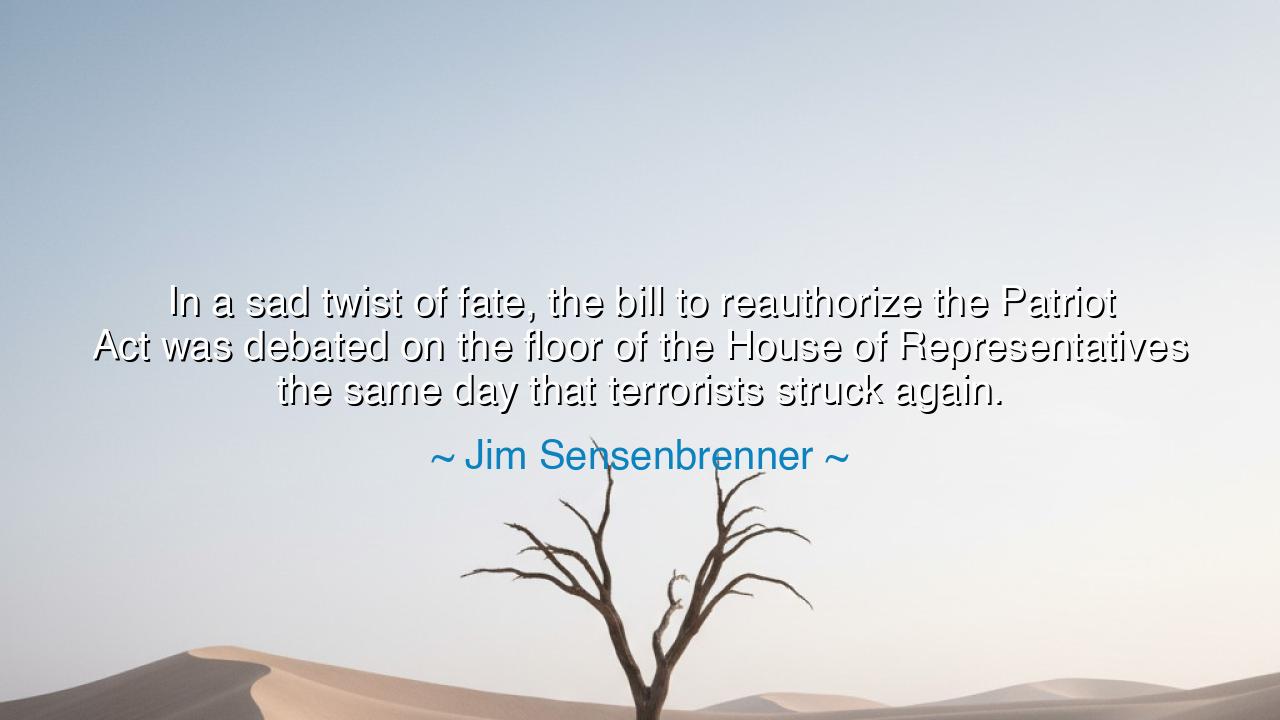
In a sad twist of fate, the bill to reauthorize the Patriot Act
In a sad twist of fate, the bill to reauthorize the Patriot Act was debated on the floor of the House of Representatives the same day that terrorists struck again.






When Jim Sensenbrenner remarked, “In a sad twist of fate, the bill to reauthorize the Patriot Act was debated on the floor of the House of Representatives the same day that terrorists struck again,” he spoke not merely as a lawmaker reporting events, but as a witness to the irony and fragility of human affairs. His words capture the tension between human governance and the unpredictable currents of history — how laws, carefully debated in chambers of reason, can collide with the raw forces of chaos and destruction. The “sad twist of fate” he describes is a reminder that even the most deliberate measures of prudence cannot shield us from the unexpected, and that our mortal plans are always at the mercy of circumstances beyond our control.
The ancients understood this paradox of human endeavor. The Greeks called it tyche, the power of chance, and the Romans knew Fortuna, the goddess whose wheel spun unpredictably, lifting and crushing men regardless of their virtue. Sensenbrenner’s reflection echoes this ancient wisdom: that no human institution, however meticulously designed, can anticipate every strike of misfortune. The debate over the Patriot Act, meant to secure a nation, was met by the stark reality of renewed violence — a collision between careful foresight and sudden calamity. Such moments reveal the limits of human control and the humility required of those who govern.
This tension between law and calamity is woven through history. Consider the siege of Athens by the Persians, where citizens debated the defense of their walls and the fate of their city while the invaders advanced swiftly and unexpectedly. The decisions made in councils were urgent, yet fate often intervened, reshaping human plans in ways no deliberation could predict. In Sensenbrenner’s observation, we see the same duality: lawmakers, tasked with protecting liberty and security, must act with foresight, but even their greatest efforts may be overshadowed by events they cannot foresee. The lesson is clear: prudence is essential, but humility before chance is inevitable.
Sensenbrenner’s words also convey a deeper moral weight. The “sad twist of fate” reminds us that tragedy is not always a matter of error, but sometimes of timing, circumstance, and the collision of forces beyond human calculation. Leaders, citizens, and even ordinary families are all subject to these moments of cruel coincidence. Yet it is in recognizing this reality that wisdom emerges: the wise prepare diligently, yet accept that some outcomes remain beyond their control. The juxtaposition of legislative debate and terrorist attack embodies this eternal lesson — that effort is necessary, but foresight is never absolute.
History provides another parallel in the life of Abraham Lincoln. On the day he delivered the Emancipation Proclamation, the nation was engulfed in the Civil War, and news of battles and losses reached him even as he spoke of freedom. The timing was bitter and ironic, yet his purpose was undeterred. Like Sensenbrenner, Lincoln understood that human plans must often coexist with catastrophe, and that courage and resolve are required even when the universe seems to conspire against order. Great leaders, he teaches, act with integrity even when events undermine the timing of their decisions.
The quote also underscores the fragility of human institutions. Laws, policies, and safeguards are crafted with intention and deliberation, yet the world remains unpredictable. Terrorist acts, natural disasters, or sudden crises will always intersect with human designs, sometimes exposing their limitations. Sensenbrenner’s reflection reminds us that vigilance and preparation are never perfect shields; they are tools, not guarantees. To govern wisely is to respect both human agency and the power of chance, balancing determination with acceptance.
The lesson for all, therefore, is twofold: first, act with diligence and foresight, knowing that your efforts can shape outcomes but never fully control them; second, cultivate humility and resilience, understanding that unforeseen events will always intersect with your plans. History is a teacher of this duality, showing that prudence and preparation matter, but that the human spirit must also endure the unpredictable turns of fate.
So, O listener, carry Sensenbrenner’s words as a guide: prepare, legislate, and act with wisdom, yet remain humble before the whirlwinds of chance. Recognize that tragedy and irony often visit together, and that the measure of virtue is not in avoiding calamity, but in responding with courage and clarity when it arrives. In this balance between effort and acceptance, between planning and humility, lies the enduring wisdom of both the ancients and modern leaders alike.






AAdministratorAdministrator
Welcome, honored guests. Please leave a comment, we will respond soon